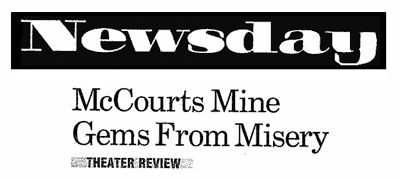|
What better vengeance against a hard, impoverished
childhood than to forge a cottage industry out of it?
That’s what sons of Ireland Frank and Malachy McCourt
have done in recent years, spinning out memoirs (Franks dark
"Angela’s Ashes," soon to be a major motion picture;
Malachy’s more lighted hearted "A Monk Swimming"),
stage entertainments (Frank’s "The Irish and How They
Got That Way") and encore appearances on TV talk shows by
prolific actor Malachy.
The inspiration for both their celebrated memoirs is "A
Couple of Blaguards," a fireside-cozy vaudeville that the
brothers McCourt spun out in the early ‘80s and
performed years after in workshops productions in Dublin and
New York’s Village Vanguard.
Unlike the bleak "Angela’s Ashes," "A Couple of
Blaguards" mixes the sweetness and kick of an Irish coffee
as its two roguish talespinners recreate the faces and
rituals of schooldays in Limerick and young adulthood in
America. Appropriately enough, the Irish coffee flows at the
Triad’s snugly conjoined tables, where patrons can dine
on authentic McCourt family recipes prior to the
performances.
Not having partaken myself, I can’t vouch for how split
pea soup goes down with recollections of "Bucketham Palace,"
the communal latrine that was shared by no less than 16
families along the McCourt’s slimy lane. That odiferous
reference is about as grubby and graphic as the evening
gets. More often, a memory of woe is likely to trigger a
nostalgic music hall number about boyhood fishing or a
mother’s love.
At it’s sharpest, however, "A Couple of Blaguards"
offers up comically adroit miniatures that stay with you:
the language-lacerating mayor of Limerick ("let me reiterate
what I am about to say") or the McCourt’s estranged
father, working as a chef in a monastery where he is
occasionally called upon to snip the hairs from the nostrils
of deceased monks.
"A Couple of Blaguards" tries to subvert any cloying
Celtic-centricity by a self-mocking wink at Irish
chauvinism.
In this instance, the attempt pays off. If it feels like a
romanticized account o the McCourts and how they go that
way, it is also a testament to the manner in which time
enables us to smile upon the rigors of our youth.
By Jan Stuart
Back
|
